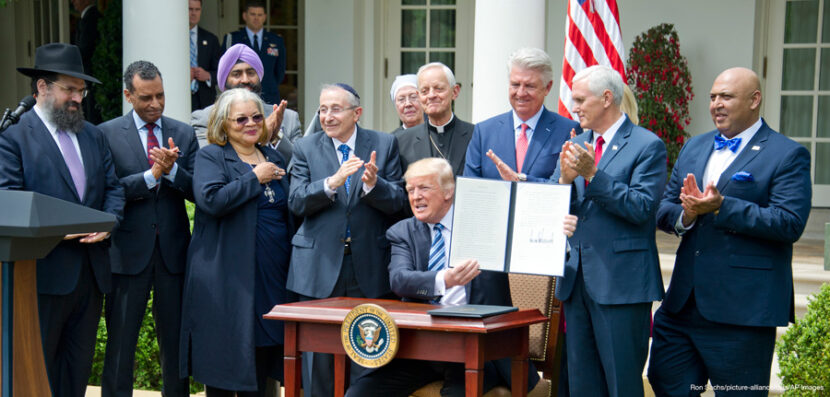
President Trump’s New Religion Executive Order
Last Thursday, President Trump signed an executive order “promoting free speech and religious liberty.” In theory, the order will allow religious groups to become more politically active without facing repercussions from the government. In his remarks, Trump also said that religious discrimination would not be tolerated, though of course this is already guaranteed under the U.S. Constitution.
What Does the New Order Do?
In practice, not very much.
First, the order takes issue with the Johnson Amendment, which was passed in 1954. The Johnson Amendment makes it illegal for nonprofit organizations, such as churches, to support or oppose specific political candidates. If they do so, then they lose their tax-exempt status, though this has only happened to a church once since 1954. According to Trump, his new executive order will protect churches from being penalized for speaking out about political issues. But that has always been the case; churches have always been free to speak up about political issues, just not to endorse a specific political candidate. In practice, nothing would change.
The second issue addressed by the executive order is birth control. Under the Affordable Care Act (the ACA, or “Obamacare”), employer health insurance plans were required to cover contraception for women at no cost to their employees. Some faith-based organizations, such as churches, received an automatic exemption from this rule. Other organizations who were opposed to paying for birth control for religious reasons had to write a letter to the federal government explaining their position, and then the federal government would step in to pay for contraception instead. But even so, some religious leaders were still morally opposed. Trump’s new executive order asks the secretaries of the Treasury, labor, and health and human services to consider amending the rules about contraception. But this does not amount to any direct change in policy.
What Is the Public’s Reaction?
Given that the new executive order changes very little in the way of actual policy, people on both sides of the issue have had somewhat muted reactions to it. The ACLU, which had been preparing to sue before the order was released, has since changed its mind, saying that the order does not contain enough concrete action for them to address.
The Freedom from Religion Foundation in Wisconsin, however, is planning to sue, stating that Trump’s executive order provides unconstitutional government support for religious organizations. Other critics have pointed out what they say is hypocrisy on the part of President Trump: that, while he claims to be against religious discrimination, his two travel bans targeting Muslim nations have already been blocked in court for discriminating on the basis of religion.


